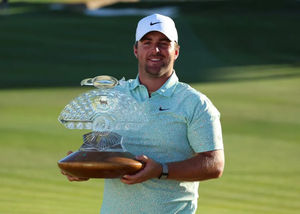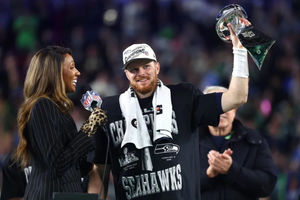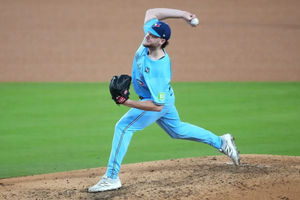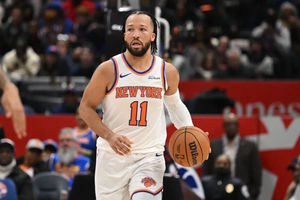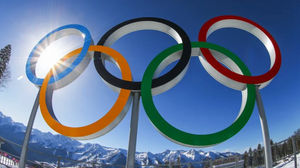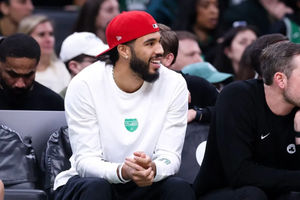Marcus Smart Did The "Right Thing" And Look Where It Got Him

Remember when Marcus Smart was the best story in college basketball? A top-three pick who opted out of a historically weak draft and into a historically loaded one, turning down millions because he wanted to improve and he wanted to win at Oklahoma State, he was Everything Right About the Game.
One desultory exit from the NCAA tournament and one altercation with a douchey Texas Tech fan later, Smart's no longer quite so golden. He's more a cautionary tale, a case study in why no one should attach moral value to what is, in the end, a simple economic decision.
When players like Smart are celebrated for returning to school, the purpose, as often as not, is to use them as a cudgel against the clueless cash-grabbers of lurid pundit fantasy, who care about nothing greater than themselves and want mainly to make NBA money. Since it makes no sense to say outright that someone is wrong to want to get paid for their work, a variety of euphemisms are used. Players who return to school are praised for not consigning themselves to careers as janky, fundamentally limited jack-up artists, for instance, or lauded for knowing that it won't be good for their careers for them to get too much, too soon. Wise and virtuous, they're willing to sacrifice in the short term for greater rewards in the long term—a choice which, happily enough, just so happens to align with the economic interests of the amateur and professional basketball infrastructure.
In this line, Smart's return, as it often is, was treated conceptually as part of a long-term plan for success in the NBA. Getting drafted without the requisite skills for your position—he's a bit of a tweener, without the handle for the point or the size for the two—means you probably won't play very much, inhibiting your development. Next thing you know, you've been in the NBA for four years, you haven't played, you're broke because you got your money before your coach had blessed you with the wisdom to know what to do with it, and now find yourself in the D-League trying to prove you can become a contributing NBA player. Word to Daniel Orton.
As Kevin Pelton has demonstrated, though, this is all nonsense. Players who leave college after one year actually develop faster in the NBA than their two-year counterparts. Pelton compared the statistical improvement between the freshman and sophomore seasons of two-year college players who were projected first-round picks after their first college season to the growth of one-and-done players see between their freshman and rookie seasons. He also compared the improvement between both groups the subsequent year.
What he found is that the one-and-dones develop much more in their first NBA year than the two-year guys do in their sophomore seasons. In fact, the college sophomores barely improve at all, and often regress. Notably, the second-year college guys see about the same rate of improvement as the one-and-dones do in their first year in the league.
All of that makes intuitive sense: Of course players improve more in a professional environment where their full focus is on basketball, rather than in a semi-professional one where they have to put a certain amount of time into struggling through their online basket-weaving courses. More than that, athletes' long-term development isn't a big concern for most college teams. They're out to win, and they make do with what's available to them. If a college coach has a big man that's a beast in the post but doesn't project to have such a physical advantage at the next level, he's a lot more likely to continue spamming that mismatch than to try and diversify his player's skillset.
All of this is why John Calipari is the smartest and, in his slickster way, the most honest man in college basketball. His sales pitch to the best of the best NBA prospects is that his style of basketball will prepare his players for their ultimate goal: NBA success. Calipari has delivered on this promise by getting an average of 3.25 Kentucky players drafted in the first round since he's been there.
And—funny coincidence—getting the best pro prospects also help you win games in college, too. Calipari's Kentucky teams have won 80.3 percent of their games, narrowly behind Kansas, Duke, Syracuse, and Ohio State (in that order) for the best clip in major conference basketball since '09-'10. By gathering up the best NBA talent and sending them right into the pros, Kentucky ensures that their current players capitalize on that happy medium between revealed talent and projectable potential while continuing to attract the next batch of superstars to follow in those guys' wake. It's a win-win for the parties that matter most.
If the patronizing justification of honing your skill in college is a fraud, though, it's not clear that it matters. It's one rationalization for players working for free, and there are always more. Some of them are naked bromides, invoking applause lights like "more prepared" and "more mature" without defining these vague terms of dubious worth. (Was Austin Rivers not mature enough or was he just not that good? And who was unprepared: Hasheem Thabeet, who decided to enter the draft, or the Grizzlies general manager who picked him second overall?)
All of it comes down to this: Players stand to lose millions by shortening their already brief peak earning years, and consequently others stand to gain millions from them doing so. Everyone making dubious claims about why players like Jabari Parker should stay in school—the league that just wants readymade stars, the union that wants less competition for veteran workers, the coaches who want the golden geese to lay as many eggs as possible—is either blatantly self-interested, or echoing the claims of the blatantly self-interested. Before listening to them, Parker should take a long look at Marcus Smart, and take note of just how much he's been rewarded for doing the right thing.
The most convincing reasons for returning are offered up by the players themselves. In an interview coming into this season, Smart said he came back to improve his point guard skills, to get a better jump shot, to try and win something, and to remain a kid again for another year. It's that last part that is the most honest, most laudable, and goes most unappreciated. A 19-year-old kid was the toast of a town that worshiped him, and he wanted to stick around and enjoy that atmosphere for another year with some of the best friends he'll ever make, before entering a cold professional environment full of interminable travel, grueling training, and countless new responsibilities. That was a perfectly fine reason to stay in school—not because it flattered the sensibilities of the pundits and the prerogatives of the coaches, but because it was his reason, on his terms.
Photo via AP
Related
The NBA’s Tanking Problem Is Getting Worse — Not Better
NBA Picks Tonight: Three Best Bets Before the All-Star Break
The Biggest Question Facing Every 2026 MLB Contender
Best NBA Betting Picks for Wednesday Feb. 11th Slate
- Early Super Bowl LXI Odds Favor Seahawks, Sleeper Betting Picks & More
- Sunday Feb 8th NBA Picks: Three Best Bets Today
- Super Bowl Betting Preview: Seahawks vs. Patriots Breakdown & Pick
- The Most Fun Super Bowl Prop Bets You Can Make This Year
- Super Bowl 60 Prop Bets: 10 Best Bets for Patriots vs. Seahawks
- UFC Fight Night at the Apex Best Betting Picks and Predictions
- NBA Betting Picks for Friday Feb. 6: Post-Deadline Predictions







